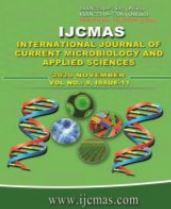


 National Academy of Agricultural Sciences (NAAS)
National Academy of Agricultural Sciences (NAAS)

|
PRINT ISSN : 2319-7692
Online ISSN : 2319-7706 Issues : 12 per year Publisher : Excellent Publishers Email : editorijcmas@gmail.com / submit@ijcmas.com Editor-in-chief: Dr.M.Prakash Index Copernicus ICV 2018: 95.39 NAAS RATING 2020: 5.38 |
A field experiment was conducted to estimate the genetic variability, trait association and path coefficient analysis among the Indian mustard genotypes during rabi, 2019. Analysis of variance revealed the mean sum of squares due to genotypes was highly significant for all the characters studies indicating the existence of ample variability among the genotypes studied. The high GCV and PCV observed for number of siliquae per plant and secondary branches per plant indicated the influence of environment on the expression of these characters were at minimum level. High heritability was recorded for character 1000-seed weight and siliqua length, moderate heritability observed for days to 50% flowering and days to physiological maturity revealed the presence of additive gene action and minimum influence of environment in expression of these characters. High heritability estimates in broad sense coupled with low genetic advance as percent of mean was observed for siliqua length and 1000-seed weight indicated presence of non-additive gene action and provide limited scope for improvement through selection. Results of genotypic and phenotypic correlation coefficient revealed that seed yield per plant had significant positive correlation with plant height at genotypic level. However, seed yield per plant recorded negative correlation with days to 50% flowering at both levels but was significant at genotypic level.
 |
 |
 |
 |
 |